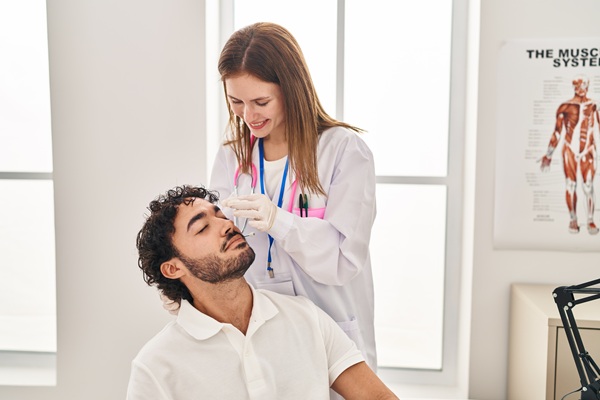5 Ways to Incorporate Vision Care Into Your Daily Routine

Maintaining eye health and preventing long-term issues is the result of consistent and quality vision care. Many people focus on overall wellness but may overlook daily habits that support healthy eyesight. However, taking simple steps each day can protect vision, reduce eye strain, and prevent future complications. By making eye health a priority, it is possible to enjoy clear vision and avoid common problems.
1. Eat foods that support eye health
Just as with overall health, a nutritious diet plays a key role in healthy vision. Certain vitamins and minerals help protect the eyes from conditions like macular degeneration and cataracts. Also, foods rich in vitamins A, C, and E and zinc and omega-3 fatty acids provide essential nutrients for the eyes.
Those wondering which foods to focus on should include leafy greens such as spinach and kale, which contain antioxidants that reduce the risk of eye disease. Additionally, fish such as salmon and tuna provide omega-3 fatty acids that support the retina's health. Excellent vitamin A (helps prevent night blindness) sources include carrots and sweet potatoes.
2. Reduce screen time and take breaks
Many people spend hours each day looking at digital screens, which can lead to eye strain and discomfort. Staring at a screen for long periods reduces blinking, which can cause dry and irritated eyes. Also, the blue light emitted by screens may contribute to digital eye strain and affect sleep patterns.
Following the 20-20-20 rule can help reduce eye strain. This involves looking at something 20 feet away for at least 20 seconds every 20 minutes, allowing the eyes to relax and reducing fatigue. Additionally, adjusting screen brightness, using blue light filters, and keeping the screen at a comfortable distance can help.
3. Practice proper eye hygiene
Keeping the eyes clean and free from irritation is important for maintaining good vision care. Dirty hands can introduce bacteria and increase the risk of infections such as conjunctivitis. Contact lens wearers must follow proper hygiene practices to avoid serious eye problems.
Washing hands before touching the eyes or inserting contact lenses helps prevent infections. Contact lenses should always be cleaned and stored in a fresh solution to avoid bacterial buildup. Removing makeup before bed prevents irritation and keeps the eyes healthy. Proper eye hygiene can prevent many common eye conditions.
4. Protect eyes from harmful UV rays
Exposure to ultraviolet (UV) rays from the sun can damage the eyes and increase the risk of cataracts and macular degeneration. Wearing sunglasses that block 100% of UVA and UVB rays provides essential protection.
Sunglasses should be worn outdoors, even on cloudy days, as UV rays can penetrate through clouds. A wide-brimmed hat can provide additional protection by reducing direct sunlight exposure. Choosing high-quality sunglasses with full UV protection helps maintain long-term eye health.
5. Get enough sleep and stay hydrated
Rest and hydration are important for healthy eyes. Lack of sleep can cause eye strain, redness, and discomfort. Proper rest allows the eyes to recover and function effectively throughout the day.
Drinking enough water helps prevent dry eyes, which can lead to irritation and blurry vision. Dehydration can reduce tear production, making it harder for the eyes to stay moist and comfortable. Staying hydrated and sleeping well each night are simple but effective ways to support vision care.
The importance of regular vision checkups
Routine eye exams are essential for detecting vision problems and maintaining overall eye health. Many eye conditions, such as glaucoma and macular degeneration, develop slowly and may not show symptoms in the early stages. Therefore, regular checkups allow optometrists to identify issues early and provide necessary treatment.
Most adults should have a comprehensive eye exam every one to two years. Those with existing eye conditions, a family history of vision problems, or chronic health conditions such as diabetes may need more frequent exams. Children should also have regular eye exams to ensure proper vision development and prevent learning difficulties caused by undetected vision problems.
Scheduling routine vision exams is one of the best ways to protect eyesight and maintain long-term eye health.
Make vision care a daily habit
Incorporating good vision care habits into daily life helps protect eye health and prevent long-term problems. Eating a balanced diet, reducing screen time, practicing good hygiene, wearing sunglasses, and staying hydrated all contribute to healthier eyes. Regular eye exams help ensure that any issues are detected early. Has it been a while since you have had your vision checked? Call us today, and make regular vision screenings part of your yearly routine.
Request an appointment here: https://www.texasoptical.net or call Texas Optical at (214) 771-7333 for an appointment in our Dallas office.
Check out what others are saying about our services on Yelp: Read our Yelp reviews.
Recent Posts
Dry eye treatment is important when occasional irritation becomes ongoing discomfort that interferes with daily activities. Many individuals experience dryness, burning, or a gritty feeling in the eyes from time to time. However, when symptoms start to affect reading, screen use, or time outdoors, a structured approach to diagnosis and care helps protect comfort and…
Myopia control focuses on slowing the progression of nearsightedness, primarily in children and teens, to help protect long-term eye health and day-to-day vision. Myopia occurs when the eye grows too long or the cornea curves too steeply, which causes distant objects to appear blurry. As the prescription increases, the risk of future eye disease also…
Retinal photography gives optometrists a detailed view of the back of the eye. When done regularly, they are often able to spot early signs of disease before symptoms affect daily vision. This advanced imaging tool helps create a clear record of eye health over time and supports smarter decisions about treatment and follow-up care. Learning…
Red, itchy eyes can affect your everyday comfort and reduce overall well-being. It is important to seek effective vision care from the first sign of irritation. Proper attention to symptoms, underlying causes, and healthy habits ensures stronger long-term eye health and greater day-to-day clarity. Redness and itchiness often stem from several common triggers. These include: Allergic…


